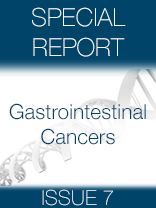Two Options Allows for Treatment Tailoring in Refractory CRC
Treatments can be better customized and tailored based on each patient's individual desires and characteristics, now that two effective options are available for refractory metastatic colorectal cancer, according to Jennifer Wu, MD.
Targeted Oncology.
In September 2015, TAS-102 (Lonsurf) was approved for patients with metastatic CRC who previously received fluoropyrimidine-, oxaliplatin-, and irinotecan-based chemotherapy, an anti-VEGF biologic product, and an anti-EGFR monoclonal antibody, if RAS wild-type. This provided the second single-agent option for patients with mCRC for this indication, as regorafenib (Stivarga) was approved in 2012 for patients with metastatic disease who had prior therapy.
“Currently, there is a focus on two single agents. One is regorafenib, which is a non-chemotherapeutic agent that showed OS benefits in refractory CRC. The other one was actually approved in SeptemberTAS-102—and, as a single agent, it also showed an OS benefit,” said Wu, an assistant professor of Medicine in the Department of Medicine at Perlmutter Cancer Center and NYU Langone Medical Center. “I think those are very good choices for our patients now.”
The TAS-102 approval was based on results from the phase III RECOURSE trial, which examined 800 patients with refractory metastatic CRC.1In the study, the overall survival (OS) for those who received TAS-102 was 7.1 months compared with 5.3 months with placebo (HR, 0.68; P<.0001). The median progression-free survival (PFS) in the TAS-102 arm was 2 months versus 1.7 months with placebo (HR, 0.48; P<.0001).
The approval for regorafenib was based on the international phase III CORRECT study,2which compared the multikinase inhibitor with best supportive care (BSC) compared with BSC plus placebo. In the findings that were instrumental in the approval, median OS was 6.4 months in the regorafenib arm compared with 5.0 months with placebo (HR, 0.77; 95% CI, 0.64-0.94;P= .0102). Median PFS was 2.0 versus 1.7 months, with regorafenib and placebo, respectively (HR, 0.49; 95% CI, 0.42-0.58;P<.0001).
“Both of these are oral agents and they have shown a pretty impressive survival benefit in similar patient populations, except that TAS-102 includes patients who had received prior regorafenib,” said Wu. “The agents each have their own side effect profile.”
In the CORRECT trial, the most common grade 3/4 adverse events (AEs) with regorafenib were hand-foot skin reaction (16.6%), fatigue (9.6%), hypertension (7.2%), diarrhea, (7.2%), and rash (5.8%). The most common severe AE was hepatotoxicity. Additionally, AEs led to a dose reduction or interruption in 67% of patients, warranting careful monitoring.
For TAS-102 the most frequently reported grade 3/4 AE was neutropenia, which was experienced by 38% of patients treated with the chemotherapy. Overall, febrile neutropenia occurred in 4% of patients, with 9% receiving G-CSF. The other most frequently reported grade 3/4 AEs of concern with TAS-102 were anemia (18%), thrombocytopenia (5%), diarrhea (3%), nausea (2%), and vomiting (2%).
“We have two options, and the choice of one versus the other depends on patient preference, prior patience experience, or prior chemotherapy. We can choose one or the other. Sometimes, it is even possible to do it sequentially,” said Wu.
Clinical trials continue to assess both regorafenib and TAS-102 as treatments for patients with mCRC and other types of cancer. For regorafenib, studies are assessing whether the approved 160 mg/day dose is appropriate. A phase II study is currently enrolling 120 patients to explore lower starting doses of the medication (NCT02368886). Additionally, for TAS-102, there is potential to explore the agent in various combinations, according to Wu.
“We know that it was tested with oxaliplatin in preclinical models, and we also know that there was an abstract presented earlier this year where TAS-102 was combined with bevacizumab in refractory CRC, and it did have pretty high response rates, as well,” said Wu. “I think that TAS-102 will be on the way to have novel combinations in the future, maybe not just with chemotherapy, but maybe more exciting stuff, such as stem cell inhibitors. It’s an open question.”
References
- Mayer RJ, Van Cutsem E, Falcone A, et al. Randomized trial of TAS-102 for refractory metastatic colorectal cancer. N Engl J Med. 2015;372:1909-1919.
- Grothey A, Van Cutsem E, Sobrero A, et al. CORRECT Study Group. Regorafenib monotherapy for previously treated metastatic colorectal cancer (CORRECT): an international, multicentre, randomised, placebo-controlled, phase 3 trial. Lancet. 2013; 381(9863):303-312.

Novel Approaches Focus on Limiting Toxicity in Older Patients With ALL
April 22nd 2024The major challenges for clinicians treating older patients with acute lymphoblastic leukemia surround the emergence of resistance to existing therapies and the toxicities associated with current chemotherapies.
Read More
Ornstein Advises on Starting Dose and Management of Lenvatinib in RCC
April 21st 2024During a Case-Based Roundtable® event, Moshe Ornstein, MD, MA, provided guidance on dosing and toxicity concerns in a patient treated with lenvatinib plus pembrolizumab for advanced renal cell carcinoma.
Read More
Rugo Surveys Peers on Treatment After Metastatic Relapse of HR+, HER2– Breast Cancer
April 20th 2024During a Case-Based Roundtable® event, Hope S. Rugo, MD, FASCO, moderated a discussion on treatment options for a patient whose breast cancer recurred several years after adjuvant therapy.
Read More